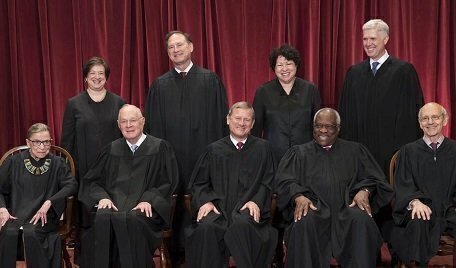A unanimous Supreme Court said on Monday that police officers who busted partiers at a vacant District of Columbia house in 2008 were entitled to immunity for placing the participants under arrest.
 Justice Clarence Thomas said in District of Columbia v. Wesby that police had probable cause to arrest the partygoers because they could reasonably infer the uninvited house guests knew they were uninvited, contrary to claims they made to the officers. The decision overrules one from the United States Court of Appeals for the District of Columbia Circuit in favor of the partygoers. “A reasonable officer, looking at the entire legal landscape at the time of the arrests, could have interpreted the law as permitting the arrests here,” Thomas said. “There was no controlling case holding that a bona fide belief of a right to enter defeats probable cause, that officers cannot infer a suspect’s guilty state of mind based on his conduct alone, or that officers must accept a suspect’s innocent explanation at face value.”
Justice Clarence Thomas said in District of Columbia v. Wesby that police had probable cause to arrest the partygoers because they could reasonably infer the uninvited house guests knew they were uninvited, contrary to claims they made to the officers. The decision overrules one from the United States Court of Appeals for the District of Columbia Circuit in favor of the partygoers. “A reasonable officer, looking at the entire legal landscape at the time of the arrests, could have interpreted the law as permitting the arrests here,” Thomas said. “There was no controlling case holding that a bona fide belief of a right to enter defeats probable cause, that officers cannot infer a suspect’s guilty state of mind based on his conduct alone, or that officers must accept a suspect’s innocent explanation at face value.”
In March 2008, two officers responded to a neighbor’s complaint of a party out of bounds at a house that had been unoccupied for several months. At the scene, the officers saw 21 party goers inside the house, in various states of celebration. Several of the party guests told police they were invited there by a woman named Peaches.
The officers spoke to Peaches on the phone, who said she had given permission to the folks to use the house and she would possibly be renting the property. But on further questioning, Peaches acknowledged she didn’t have the current owner’s permission to use the house. The home’s owner also confirmed to police the party goers didn’t have permission to be at the house. The officers then arrested the party goers, but prosecutors didn’t prefer charges against them.
The incident didn’t sit well with 16 of the detained guests, who sued the two police officers and the District of Columbia. They claimed the police violated their Fourth Amendment rights because there wasn’t probable cause for their arrests. The United States District Court in the District of Columbia awarded about $1 million in damages to the party goers. A split federal appeals court also ruled against the officers and the District, rejecting arguments that the officers shouldn’t have to pay damages directly since they were making a judgment call while on duty.
The District and the officers then appealed to the Supreme Court, arguing that the lower court’s decision conflicted with other federal courts and the Supreme Court’s own precedents.







